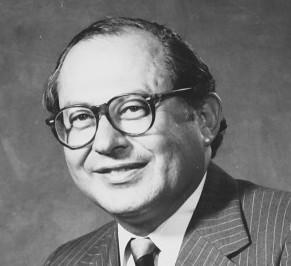Alumnus Profile: Sandy Socolow ‘46

He was “the solid oak Walter Cronkite could lean on,” as the great CBS newsman Morley Safer put it. “He was part of the lore of the newsroom–the soul of CBS News.”
Safer was speaking about Sandy Socolow ’46, one of the founding fathers of television news. Socolow, who passed away in January at the age of 86, helped make CBS News into the nation’s dominant television news organization during the Cronkite era. The cause of death was cancer, according to Socolow’s family.
He was “one of the most important newsmen of my time,” said Carl Spielvogel, a former New York Times columnist and ambassador, and a long-time Socolow friend.
“Soc”, as he was known, held a number of high-level jobs at CBS News, including Washington Bureau Chief, London Bureau Chief, and Executive Producer of the CBS Evening News. He served as a right-hand man to Cronkite for many years, first on the daytime news show Eyewitness to History in the mid-1950s and then on the Evening News from the early 1960s until Cronkite’s retirement in 1981. Socolow was so close to Cronkite that he was chosen to offer a eulogy at the anchorman’s memorial service in 2009.
Socolow may have held high positions at CBS, but he never acted the part. He spent much of his career mentoring younger staff members, and keeping the news anchored in accuracy and balance.
“He never once played the part of an important person,” recalled Sonny Fox, a former journalist best known for being the host of the children’s show Wonderama. “And that, in our business, I have to tell you, is one of the rarest things to happen.”
Socolow worked particularly hard to bring women and minorities into the newsroom, who held few positions of authority in most news organizations in the 1950s and 60s.
“As one producer said, ‘working with Cronkite and Soc was the tv journalist’s version of, well, clerking in the Supreme Court,’” explained Linda Mason, the former Senior Vice President of CBS News.
Mason had worked for years producing stories for CBS News during the 1960s, but said she was unable to gain the title “Producer” at the time simply because she was a woman. Socolow was the one who finally asked her to become a Producer of the CBS Evening News in 1971—the first time a woman had ever held that position.
“He was a great mentor,” said Mason. “Without any fanfare, he made it possible for women and minorities to take their seats in the newsroom.” (cont.)
Socolow was born in the Bronx, but spent his childhood on a farm in Connecticut. He attended Stuyvesant after his family returned to New York when he was 10. Socolow started his career in journalism at the Stuyvesant Spectator, and would later tell friends that his love of journalism was kindled on East 15th Street.
Socolow went on to Baruch College—then the downtown campus of City College–and then to CCNY uptown, where he edited one of the school newspapers and served as a copyboy for the New York Times. His budding career as a newspaper reporter was interrupted when he was drafted for the Korean War. Socolow worked in a broadcasting unit for the Army, preparing broadcasts for the United Nations command for Chinese and Korean audiences, which set him on a path to move into television after the conflict ended.
Evening news was just starting to become prominent when Socolow joined CBS News in 1956, after stints at the International News Service and now defunct-Dumont network, where he worked with future 60 Minutes correspondent Mike Wallace. In the 1950s, newsmagazines like Edward R. Murrow’s See It Now ruled television. With Socolow as a producer and Cronkite taking the anchor chair, the Evening News began to function as an electronic version of the front page of a newspaper, expanding from 15 minutes to a half hour in 1963.
At its peak, more than 20 million people per night watched the CBS News with Walter Cronkite, which is more than watch all three network nightly news shows today combined.
Socolow produced numerous iconic stories, including Cronkite’s infamous commentary against the Vietnam War in 1968, the coverage of the lunar landing in 1969, and the network’s coverage of the Watergate scandal from 1972-74.
If Cronkite’s catchphrase was “and that’s the way it is,” then Socolow’s was “Right on”—a phrase that often replaced “Yes,” long after the hippie era ended. “I often asked him what that meant. He could never explain it,” said Spielvogel.
After leaving CBS News in 1988, Socolow continued to work at with Cronkite on independent productions. He also developed the prize-winning World Monitor television news broadcast for the Christian Science Monitor, which he said was one of his proudest professional achievements.
Socolow remained a “wise man” in the news business until the end of his life, and always stressed the importance of hard news reporting rather than what he called today’s “avalanche of trivia, gossip, titillations aimed to entertain first, not inform.”
“There is more quality news and information available today than ever,” Socolow wrote last year. “Just look, dig for it. It is worth the search.”
Right on, Soc.
